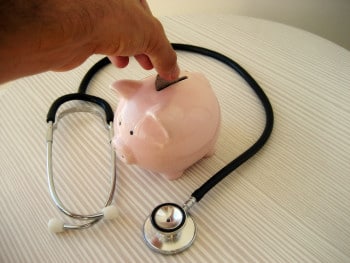When you’re buried under a mountain of debt, bankruptcy protection is there to help you get back on track. A new study suggests that it’s not only good for your wallet, but good for your health.

What Is Bankruptcy?
Bankruptcy is a legal process that helps you reorganize your finances and get rid of excess debt. There are two main types of consumer bankruptcy: Chapter 7 and Chapter 13.
The Bankruptcy Code
Chapter 7 and Chapter 13 are named for the relevant parts of the bankruptcy code. In Chapter 7, you’ll work with your attorney and the bankruptcy trustee to separate your assets into “exempt” and “nonexempt” categories. The exemptions are determined by state law; they usually cover equity in your home and car, a certain amount of cash, your retirement accounts, personal belongings, and other property. California offers two different sets of exemptions to cover different amounts of different types of property. Exempt property is left out of the bankruptcy process while nonexempt property is sold and used to repay your creditors. Most debtors have only exempt property and so don’t have to surrender anything. At the end of the process, whatever unsecured debt remains will be “discharged,” or completely forgiven. Chapter 7 is reserved for people most in need of bankruptcy protection; only those who meet certain income guidelines qualify.
In Chapter 13, you and your attorney will come up with a payment plan based on your income or the value of your non-exempt assets. The plan will last 3-5 years and you can use it to catch up on your mortgage and car payments. You also don’t have to give up any property. At the end of your payment plan, your remaining unsecured debt is discharged. Because of the provisions for catching up on mortgage payments, this type of bankruptcy is a good option for avoiding foreclosure.
Note that both types of bankruptcy provide for a discharge of unsecured debts. These include credit card bills, medical bills, and personal loans. Those debts are completely wiped out and you won’t owe anything else to those creditors. Secured debts, such as your home and your car, are treated differently. Bankruptcy will wipe out your personal liability for secured debt. This means that if the property is repossessed or foreclosed and sold for less than you owe, you don’t have to pay the difference. However, you’ll have to pay the debt if you want to keep the property. You can choose to keep the property and keep making payments or you can choose to surrender the property and walk away with no further liability.
Both types of bankruptcy give you the protection of the automatic stay, which is a legal provision that prevents any collection actions during a bankruptcy. That means you’re safe from repossession, foreclosure, collection lawsuits, wage garnishment, and other collection actions during the bankruptcy process. The automatic stay is designed to give you the space you need to work out your finances and to make sure your creditors are all addressed through the bankruptcy process.
How Debt Affects Your Health
Financial trouble is stressful – you’re worrying about how to make ends meet, whether you can keep your home, and more. More than 60% of Americans report that financial concerns are their top cause of stress. Stress, in turn, is bad for your health. In fact, high stress levels can actually shorten your life expectancy and increase your risks for cancer, heart disease, and other health problems. Debt-induced stress also increases your risk for anxiety and depression. In other words, it isn’t just a problem for your wallet – debt affects your health.
A recent study by the National Bureau of Economic Research found that bankruptcy is quite successful at improving filers’ financial situation. Specifically, those who file for bankruptcy increase their average annual earnings by more than $5,000. The 5-year foreclosure rates for those who file bankruptcy are also 20% lower than for those who don’t file.
Even more interesting, the study found that the 5-year mortality rate for bankruptcy filers is 1.2% lower than for non-filers. The study suggests that the stress of financial difficulties can cause serious health problems and bankruptcy relief can alleviate that stress.
The average indebted American household has more than $16,000 in credit card debt alone – that’s a big number to worry about, especially in a tough economy. That stress can cause a variety of physical and mental health problems. At the very least, it’s a terrible burden to have to deal with every day. Even worse, it can often feel like you don’t have any options for getting out of debt and improving your financial situation. The good news is that there are lots of ways to deal with your debt, from consolidation or debt settlement to bankruptcy.
Questions About Bankruptcy?
If you’re dealing with debt, we may be able to help. The experienced California bankruptcy attorneys at Borowitz & Clark have helped thousands of clients get their debt under control and their finances back on track. Contact us today for a free consultation and case evaluation to talk about your financial situation and your options for dealing with debt.
Image Credit and License
